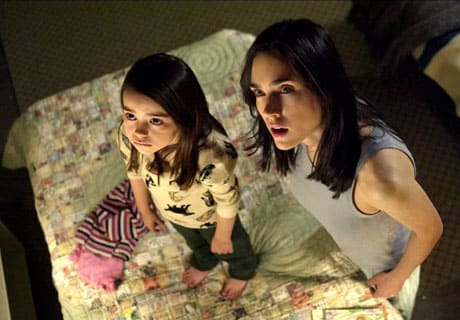Jennifer Connelly seems to have an interest in real estate gone terribly wrong. Maybe she has had some bad experiences. Needless to say, Dark Water represents her second film in a row to adhere to such subject matter (after House of Sand and Fog). Directed by Walter Salles (in his English language debut, after such acclaimed films as Central Station and The Motorcycle Diaries), Dark Water adapts The Ring author Koji Suzuki's story of a single mother (Connelly) and her daughter's (Ariel Gade) difficulties adjusting to a particularly "spiritual" apartment, complete with a metaphoric leak in the ceiling.
The film begins with some incredibly nostalgic shots displaying murky cinematography that quickly establishes that this film is directed by an award-winning foreigner, as opposed to Wes Craven. Panning shots of New York City eerily resemble Rosemary's Baby, and the film is also quick to compare itself to such 1970s American psychological horror films such as Baby and The Exorcist in most of the narrative elements as well (a single, or at least isolated, mother with some inner demons; an overly imaginative child).
At first it seems Salles might have the talent to pull off such a comparison. The build-up is nicely executed, and the subtext is laid out in a manner that leads you to believe the completed work could blow one away. Even the actors, complete with four Academy Award nominees (Connelly, John C. Reilly, Pete Postlethwaite, and a great Tim Roth), are in top form.
But like many horror films that attempt more, it doesn't quite make it all the way. The frightful build-up never really turns into real scares and the subtext withers away into a mess of confused twists. And even if it had pulled it off, it's certainly suggestive of the state of American filmmaking that Touchstone had to hire a Japanese writer and a Brazilian director to attempt to bring a genre back to a heyday it had 30 years ago. (Touchstone/Buena Vista)
The film begins with some incredibly nostalgic shots displaying murky cinematography that quickly establishes that this film is directed by an award-winning foreigner, as opposed to Wes Craven. Panning shots of New York City eerily resemble Rosemary's Baby, and the film is also quick to compare itself to such 1970s American psychological horror films such as Baby and The Exorcist in most of the narrative elements as well (a single, or at least isolated, mother with some inner demons; an overly imaginative child).
At first it seems Salles might have the talent to pull off such a comparison. The build-up is nicely executed, and the subtext is laid out in a manner that leads you to believe the completed work could blow one away. Even the actors, complete with four Academy Award nominees (Connelly, John C. Reilly, Pete Postlethwaite, and a great Tim Roth), are in top form.
But like many horror films that attempt more, it doesn't quite make it all the way. The frightful build-up never really turns into real scares and the subtext withers away into a mess of confused twists. And even if it had pulled it off, it's certainly suggestive of the state of American filmmaking that Touchstone had to hire a Japanese writer and a Brazilian director to attempt to bring a genre back to a heyday it had 30 years ago. (Touchstone/Buena Vista)
